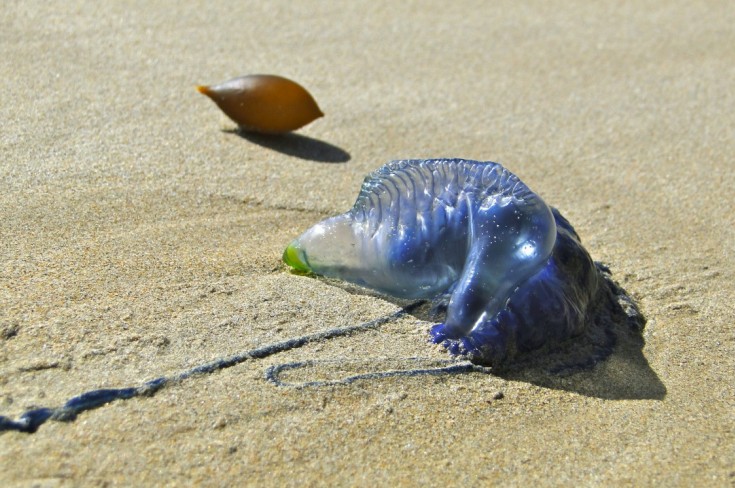Bluebottles - Information for Beach Visitors and Managers
A beach washed Bluebottle. Note the gas filled float and the tentacle used to capture food.
(Photo Kathy Turner, Parks Victoria)
Scientific name: Physalia utriculus
Common names: Bluebottle, Pacific Man of War, Portuguese Man of War
Similar species: Physalia physalis, Portuguese Man of War – a larger species found in all the world's tropical and subtropical oceans.
Significant numbers of potentially harmful "Bluebottles" sometimes wash up ashore and are observed in coastal water in southern Port Phillip, and along the ocean coasts of both Mornington and Bellarine peninsulas in late November and December.
Bluebottles are frequently seen along the east coast of Australia during summer months although are not usually as common in southern and western Victoria.
The sudden appearance of large numbers of Bluebottles are a consequence of prevailing winds and currents over previous days and weeks pushing these animals through the water, some of which wash up on beaches.
Description
Bluebottles have a conspicuous elongate blue float and a long blue tentacle.
In Physalia utriculus the float rarely exceeds 10 cm with the tentacle less than 3 metres.
Tentacles can be seen fully extended or may be contracted to down a few cm in size
The Bluebottle is very similar to the large Pacific Man-of-War which has floats to 15 cm in length and multiple fishing tentacles which can extend to 10 metres in large animals.
Distribution
The Bluebottle is found in marine waters throughout Australia.
Bluebottles are more common on exposed ocean beaches after strong onshore winds and are rarely found in sheltered waters.
Biology
Bluebottles are animals that belong in the Phylum Cnidaria which includes corals, anemones, and jellyfish, all of which use specialised stinging cells in their tentacles to capture food.
Unlike true jellies the Bluebottle is not a single animal but a colony of four kinds of highly modified individuals (polyps) which are dependent on one another for survival.
The mainly blue float (pneumatophore) is a single individual polyp that supports the rest of the colony, and is a living, muscular bag that secretes its own gas similar to air.
The tentacles (dactylozooids) are polyps concerned with the detection and capture of food which can contract and convey their prey to digestive polyps (gastrozooids).
Reproduction is carried out by the gonozooids, another type of polyp.
Life cycle
Bluebottles are hermaphrodites, so each individual gonozooid consists of male and female parts.
The fertilised egg develops into a planktonic larval form which produces the large Physalia colony by asexual budding.
Did you know?
The float of a Bluebottle has aerodynamic properties and it is likely that sailing characteristics may be modified by muscular contraction of the crest.
Bluebottles sail at a slight angle downwind and the course is determined by the curvature of the float and the underwater resistance of the rest of the colony.
The float may project either to the left or to the right; the left-handed forms sail to the right of the wind and vice versa, so if the sailing angle of one form leads to its stranding on the shore, the others sailing to the opposite side of the wind may escape.
Danger to humans
Bluebottles can deliver a painful sting even when washed up dead on the beach.
Bluebottle tentacles will cause a sharp, painful sting if they are touched, which is aggravated by rubbing the area.
Intense pain may be felt from a few minutes to many hours and develops into a dull ache which then spreads to surrounding joints.
The affected area develops a red line with small white lesions and in severe cases blisters and weals looking like a string of beads may appear.
Victims may exhibit signs of shock.
Children, asthmatics and people with allergies can be badly affected and many cases of respiratory distress have been reported in Australia.
To avoid being stung do not touch animals with bare skin if on the beach and do not enter the water if they are present.
Treatment
If stinging occurs, leave the water immediately.
Wash off any adherent tentacles with salt water.
If any part of the animal is still sticking to the skin, it should be gently lifted off with tweezers or a gloved hand to minimise the firing of more stinging capsules.
Do not rub the area with wet sand or towel, or wash with alcohol as this will only make it worse.
Apply a cold pack over a tissue or cloth, or apply ice wrapped in a wet cloth over the sting site for 10-20 minutes.
Reassess pain, then reapply cold pack or ice if necessary. Send for medical aid if cold fails to relieve pain, or other symptoms develop.
In extreme cases resuscitation may be needed and medical attention should be sought.

